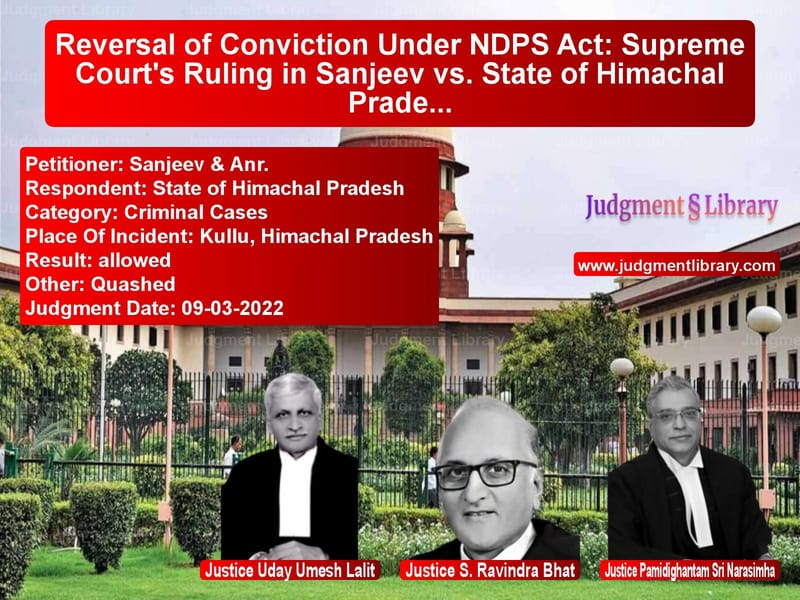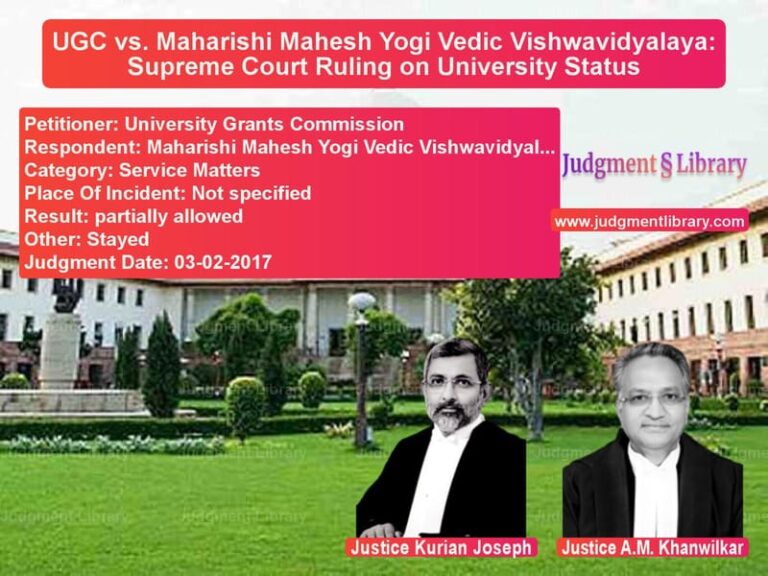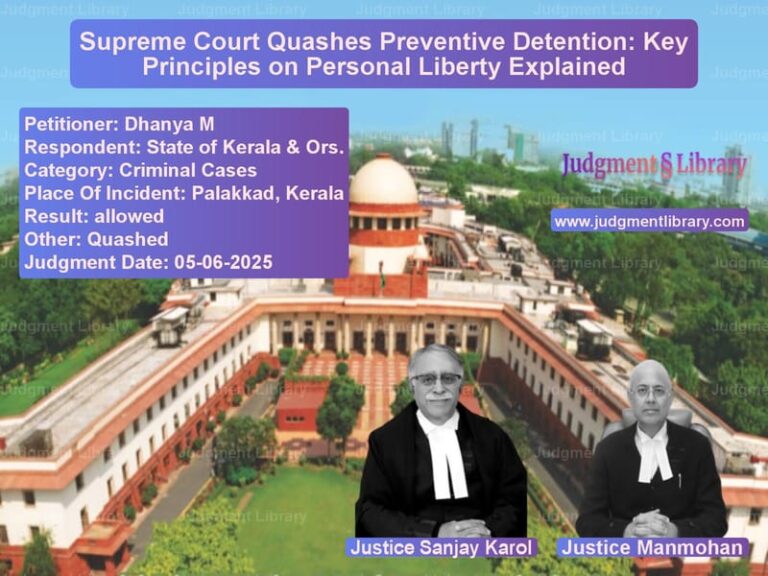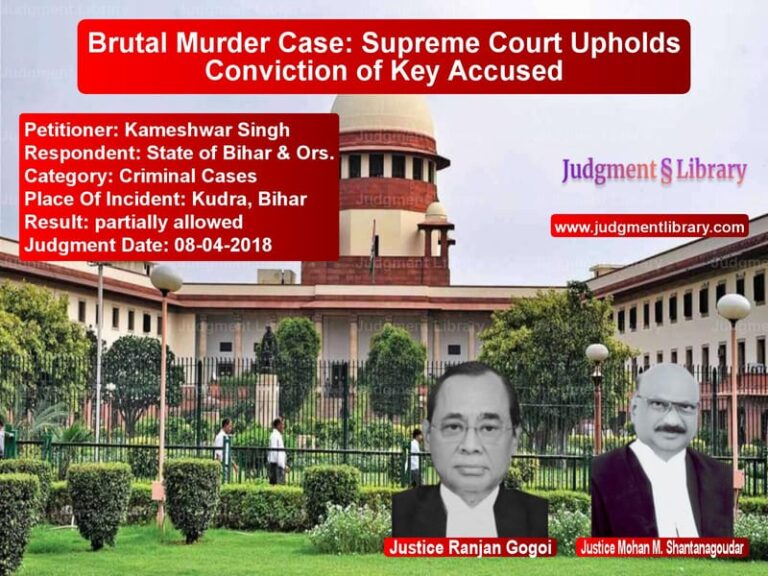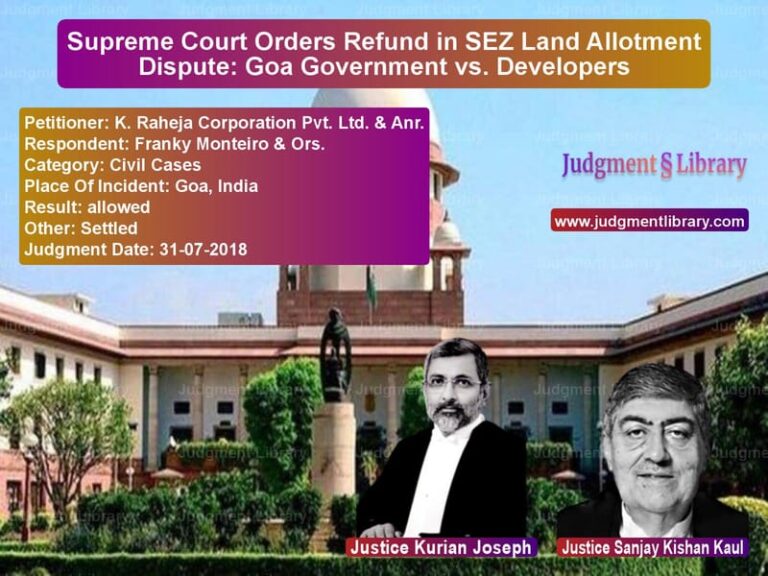Reversal of Conviction Under NDPS Act: Supreme Court’s Ruling in Sanjeev vs. State of Himachal Pradesh
The case of Sanjeev & Anr. vs. State of Himachal Pradesh revolves around the conviction under the Narcotic Drugs and Psychotropic Substances Act, 1985 (NDPS Act) and the procedural lapses in search and seizure operations. The Supreme Court had to determine whether the High Court was justified in overturning an acquittal by the trial court and convicting the accused.
Background of the Case
The appellants, Sanjeev and another accused, were arrested on December 22, 2010, near Ruara Bridge, Kullu, Himachal Pradesh. The prosecution alleged that the police found them sitting by a bonfire with a red-colored bag beside them. Upon seeing the police, they attempted to flee but were apprehended. The police claimed that the bag contained 1.5 kg of charas.
The trial court acquitted the accused on August 31, 2012, citing procedural lapses, particularly:
- The absence of independent witnesses.
- Failure to comply with mandatory provisions under Section 50 of the NDPS Act, which mandates informing the accused of their right to be searched before a Magistrate or Gazetted Officer.
- Deficiencies in the forensic examination report.
The State of Himachal Pradesh challenged this acquittal before the Himachal Pradesh High Court, which, on May 26, 2016, reversed the acquittal and sentenced the appellants to 10 years of rigorous imprisonment along with a fine of Rs. 1 lakh. The accused then approached the Supreme Court.
Petitioner’s Arguments (Sanjeev & Anr.)
The defense raised the following arguments:
- The trial court had correctly pointed out the lapses in the prosecution’s case.
- The accused were not informed about their right under Section 50 of the NDPS Act.
- The forensic report failed to establish that the seized substance was charas beyond reasonable doubt.
- The High Court did not adequately consider the presumption of innocence in favor of the acquitted accused.
Respondent’s Arguments (State of Himachal Pradesh)
The prosecution countered:
- The High Court had re-evaluated the evidence and found the trial court’s decision erroneous.
- The police had followed proper procedures in seizing and sealing the contraband.
- The forensic report confirmed that the substance was charas.
- The accused’s attempt to flee upon seeing the police indicated guilt.
Supreme Court’s Observations
The Supreme Court examined three key aspects:
- Section 50 of the NDPS Act: The accused were not informed of their right to be searched before a Magistrate or Gazetted Officer. Although this provision applies primarily to personal searches and not bag searches, the Court held that compliance would have added credibility to the prosecution’s case.
- Independent Witnesses: The absence of independent witnesses raised doubts about the fairness of the investigation.
- Forensic Report Deficiencies: The forensic report did not explicitly confirm that the seized substance met the legal definition of charas.
The Court emphasized:
“The High Court, while overturning an acquittal, must consider whether the trial court’s findings were palpably wrong, manifestly erroneous, or demonstrably unsustainable. If two views are possible, the appellate court must be slow in interfering with an acquittal.”
Final Judgment
The Supreme Court ruled:
- The trial court’s acquittal was justified based on procedural lapses.
- The High Court’s decision to overturn the acquittal was incorrect.
- The appellants were acquitted, and any fine paid was to be refunded.
Key Takeaways from the Judgment
- Procedural Safeguards Are Essential: Compliance with the NDPS Act’s provisions, especially regarding search and seizure, is crucial for convictions.
- Presumption of Innocence: Acquittals should not be overturned unless the findings of the trial court are manifestly perverse.
- Independent Witnesses Strengthen Cases: The absence of independent witnesses weakens the prosecution’s case.
Conclusion
This ruling reinforces the principle that procedural fairness is as important as substantive evidence in criminal trials. The decision sets a precedent for ensuring strict compliance with NDPS Act provisions to avoid wrongful convictions.
Petitioner Name: Sanjeev & Anr..Respondent Name: State of Himachal Pradesh.Judgment By: Justice Uday Umesh Lalit, Justice S. Ravindra Bhat, Justice Pamidighantam Sri Narasimha.Place Of Incident: Kullu, Himachal Pradesh.Judgment Date: 09-03-2022.
Don’t miss out on the full details! Download the complete judgment in PDF format below and gain valuable insights instantly!
Download Judgment: sanjeev-&-anr.-vs-state-of-himachal-pr-supreme-court-of-india-judgment-dated-09-03-2022.pdf
Directly Download Judgment: Directly download this Judgment
See all petitions in Drug Possession Cases
See all petitions in Bail and Anticipatory Bail
See all petitions in Fraud and Forgery
See all petitions in Extortion and Blackmail
See all petitions in Custodial Deaths and Police Misconduct
See all petitions in Judgment by Uday Umesh Lalit
See all petitions in Judgment by S Ravindra Bhat
See all petitions in Judgment by P.S. Narasimha
See all petitions in allowed
See all petitions in Quashed
See all petitions in supreme court of India judgments March 2022
See all petitions in 2022 judgments
See all posts in Criminal Cases Category
See all allowed petitions in Criminal Cases Category
See all Dismissed petitions in Criminal Cases Category
See all partially allowed petitions in Criminal Cases Category

